Why Does it Take So Long to Receive a Specialty Medication?

Typically, Americans are accustomed to picking up most common prescription medications same day or the next day at their preferred pharmacy. On occasion, delays occur depending on the type of medication, for example medications that are high cost or low usage. If you have ever been prescribed a specialty medication, you have most likely also learned that it may not be dispensed from your preferred pharmacy.
Specialty medications are often sent to specific specialty pharmacies that have the capability to complete the order. Specialty medication characteristics can vary since there is no standard industry-wide definition, but they are typically high cost, require special handing, sometimes challenging to administer, may require additional monitoring, compliance with risk evaluation and mitigation strategies (REMS), and documentation of both side effects and response to therapy.1 Specialty pharmacies attempt to optimize patient care, maximize patient adherence, and do so as cost effectively as possible, while minimizing avoidable waste. Traditional pharmacies may lack the time and resources to properly train staff all the steps required to effectively dispense, manage, and provide the patient education required with specialty medications.1
Unfortunately, due to the multi-organizational involvement and the complexity of the fulfillment process, patients may experience delays in obtaining their prescribed specialty medication which can range from days to weeks. So, what is the preferred method to get patients their specialty medications in a timely and accurate manner?
Over a decade ago, specialty prescription “Hub” solutions were created to provide a service to help patients and their providers manage the specialty medicine approval fulfillment process implanted by insurance companies or payers. A Hub needs to successfully connect specialty medication stakeholders which can include the patient, their physician, the insurance provider, the specialty pharmacy, and possibly biopharmaceutical manufacturer. This centralized model helps to define what Hub services include.
Still, significant challenges remain, including pharmacy benefit managers (PBMs) delaying the process when faster options were available.2 Due to the rise in specialty prescribing and reduced pharmacy staff, processing procedures can get backed up and become stagnant.2
Veradigm recently introduced AccelRx™, a specialty medication solution designed to help ease the challenges associated with specialty medication fulfillment. Taking a difficult, sometimes manual, and time-consuming process and converting it to a comprehensive automated process will help patients get their specialty medications faster while reducing some of the burden on physicians. AccelRx™is designed to facilitate the process of fulfilling specialty medication prescriptions - as a pharmacist, I am excited to see how this service will improve patient care and outcomes.
References:
- Specialty Drugs: A Primer for Pharmacists and Technicians Volume 2014, Course No,306 Pharmacist’s Letter
- https://communityoncology.org/the-real-life-patient-impact-of-pbms-volume-i/